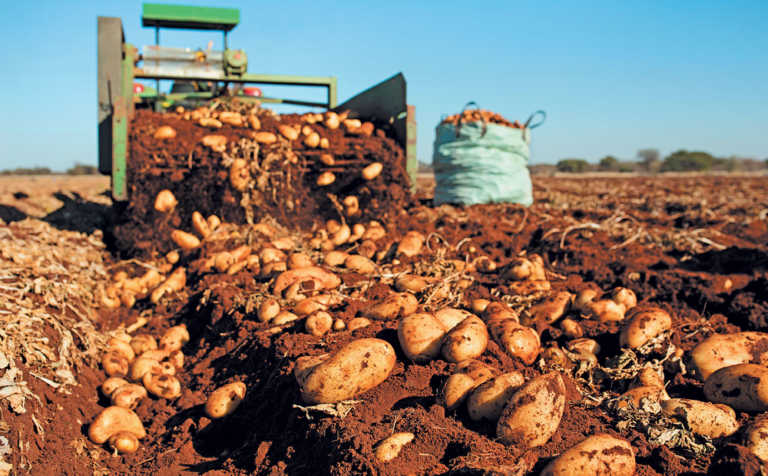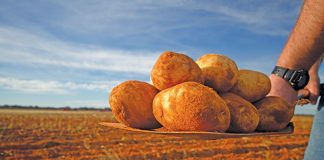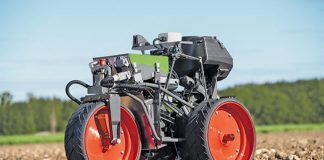
Photo: Gerhard Uys
Nico Wagner and his wife, Manlie, run a mixed operation on their 6 300ha farm, Wilnick Boerdery, near Tolwe in Limpopo.
They produce potatoes, sweetcorn and sorghum, breed livestock and game, and run a small hunting operation. Approximately 6 000ha are under natural grazing, and 300ha under irrigated croplands.
Nico’s quality produce and sustainable production practices make him stand out among his peers, and he was recently named the 2017 Syngenta Potato Farmer of the Year.
“There’ll always be opportunities for those who produce quality products,” he says. “By consistently delivering produce of above-average quality, you can create demand even when supply is high.”
To further ensure good demand, Nico plants Mondial potatoes, a cultivar popular amongst consumers and, therefore, market agents.
Nico says that small changes made to production principles make a difference to quality.For example, the potatoes are harvested by hand, to prevent mechanical damage, and packed on the farm.
Harvesting is also halted when the ambient temperature reaches 38˚C.
Farmers in the Tolwe area face harsh conditions, with an average rainfall of 400mm and temperatures often reaching 40˚C.
As part of his efforts to keep quality consistent, Nico employs sustainable production practices. In this part of the world, that first and foremost means using water efficiently.
Lowering water usage
Potatoes can be produced efficiently with less water than that required by many other crops, explains Nico.
For example, potatoes that receive 450mm of rain every year can deliver up to 55t/ha, which is far higher than maize produced under the same conditions.
“Potatoes are a water-efficient crop,” says Nico. “But soil water content and correct water scheduling is a must. You also have to guard against unnecessary leaching.”
To this end, he uses probes to measure and analyse soil moisture levels and transpiration.
“We irrigate when it’s cooler and there isn’t much evaporation,” he explains. “It’s also important to get the groundwater levels to capacity, because if you realise late that the levels are too low, you often over-irrigate as you try to play catch up.”
Preparing the soil
Soils on Wilnick range from sandy to loam. This variance means that it is crucial to take soil samples before making any fertiliser adjustments. Leaf analysis is also done on the plants.
Nick employs NviroTek Laboratories to provide these services. They also advise on nutritional supplements needed to optimise quality and yield.
Organic fertiliser is a mainstay of Nico’s fertilisation programme, and the use of micro- and macroelements is of cardinal importance. Atlas thus produces a slow-release granule fertiliser according to Nico’s specifications.
This attention to detail has paid dividends; he saw a 10% yield increase and a change in plant colour after starting to apply microelements.
Potatoes are planted on between 200ha and 250ha on a three- to four-year rotation programme with sweetcorn and a feed sorghum cover crop. The latter is used as standing hay for the cattle enterprise, and as a cover to build up soil humus levels.
It also helps maintain soil moisture levels by reducing evaporation. The potatoes are under irrigation as rainfall in the area is too low to allow for sustainable dryland growth.
Pests & Production
“A potato is a crop that’s attacked from all sides,” Nico says. The main threats are nematodes and certain fungal diseases. He therefore relies mainly on Laeveld Agrochem products and Syngenta’s potato packs as his main form of pest control.
“Potatoes are also fuel-, electricity- and labour-intensive,” says Nico. “If these three costs aren’t well managed, it will have a radical effect on profits.”
With labour, the aim should be to mechanise in ways that can save labour without cutting day jobs, he explains. “You can, for example, mechanise aspects of production that have to run through the night.”
Fuel can be saved by using implements that perform two or even three actions simultaneously. Nico recently invested in implements such as the Agromasz high-speed, compact disc-harrow supplied by Agri Pieces SA.
This cuts crop residue, incorporates surface trash without inverting the soil profile, and lays the seedbed.
Nico established a packhouse 15 years ago. This enables him to sort, pack and palletise products, and add even more value by sorting the potatoes into different sizes according to a client’s specifications. Wilnick processes 12 000t of potatoes per year through the packhouse.
Monitoring the market
“You have to have your finger on the pulse of everything,” says Nico. “An operation must not be so large that you can’t manage it. I know exactly how much we have to produce in order to be to be efficient. And I’ve developed the ability to read the market quite well and predict what it will do. I also have the advantage of having been on the farm for over 20 years!”
He adds, however, that volatility due to weather, for example, can still catch a farmer by surprise. In such instances, it’s necessary to be able to adapt rapidly.
“Moderate tendencies usually rule the market, but you still have to use market information that’s easily accessible through tools like phone apps to know what’s going on,” he says.
“You have to be able to make a plan and change your strategy when necessary.”
Wilnick brands its produce and sells directly to local markets and chain stores. Nico maintains high standards of customer care, informing clients when products are available, and runs a Wilnick website and Facebook page.
He has found that these platforms help generate business.
“Social media is not something to underestimate,” he stresses.
Employee management
At Wilnick, there’s a sharp focus on employee wellness.
“We’re a labour-intensive farm and workers with happy hearts are efficient and focused,” says Nico.
A crèche on the farm takes care of approximately 15 workers’ children, a mobile clinic visits the farm monthly, and church services are held twice a week.
“It’s important that you sow things of eternal value into workers’ lives,” says Nico, who leads the services. “Work is important, but our goal on earth is to win souls for eternity.”
Wilnick is one of the main employers in the area. The farm has 60 permanent workers, while the packhouse provides jobs for 100 workers for six months of the year. In addition, there are about 200 seasonal workers.
Nico also mentors emerging farmers. This entails a 50:50 partnership between Wilnick and an emerging farmer, where all the necessary farming and management skills are transferred over a period of five years.
Nico believes that for an emerging farmer, such a collaboration is the most effective way to achieve commercial independence and food security.
“You have to identify a willing partner and see who can contribute to what part of the business,” he explains.
“Profitability, effectiveness, negotiations and trust are key. There’s often a lack of skills and access to funding. But working together as mentor and emerging farmer, we can make use of the Agricultural Research Council, which has many experts who can be approached to help. Fertiliser and seed companies also have experts who can assist at no cost.”
Phone Manlie Wagner on 015 065 0448, or email [email protected]. Visit wilnick.co.za.











